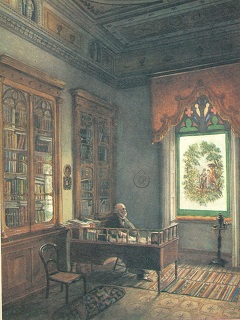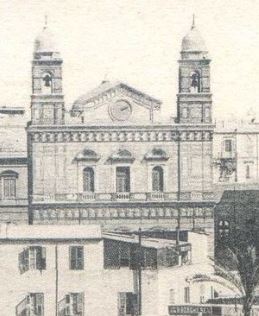

Home News & Events Study Research Members & Staff Publications Friends of the Hellenic Institute Contact Us
RESEARCH PROJECTS
 George Etheridge's Autograph Encomium on Henry VIII, addressed to Queen Elizabeth I
George Etheridge's Autograph Encomium on Henry VIII, addressed to Queen Elizabeth I
This is a full electronic edition, translation, and commentary for an unique text: a Greek encomium, written by George Etheridge, the first Regius Professor of Greek at the University of Oxford. It praises the deeds of Henry VIII and was intended to be presented to his daughter, Elizabeth I.
 A Catalogue of the Greek Manuscript Collection of Lambeth Palace Library
A Catalogue of the Greek Manuscript Collection of Lambeth Palace Library
The catalogue was published online in downloadable PDF format on the websites of LPL and of the Hellenic Institute in April 2016, thus further enhancing the accessibility of, and interest in, this collection among scholars and the public worldwide. It will shed light on textual, palaeographical and codicological aspects of these important manuscripts which so far remain largely unexplored and will advance our knowledge on the relations between the Anglican Church and the Eastern Orthodox Patriarchates between the sixteenth and nineteenth centuries, a period of major political and ecclesiastical changes in Europe and the Middle East.
 Seminar on Editing Byzantine Texts
Seminar on Editing Byzantine Texts
The Seminar, the only of its kind in London, has been the focus of Byzantinists specializing in various areas, such as textual criticism, language and literature, palaeography, history and historiography, theology and art history. The Seminar always tries to reach its decisions by common consent, in a spirit of friendly co-operation and discussion, each member contributing his/her own expertise and experience. More importantly, graduate students have the opportunity to learn and practise the editorial process, from the transcription of manuscripts to the final stages of publication of critical editions and annotated translations of Byzantine texts.
 The Greek Community in London, 1500-1945
The Greek Community in London, 1500-1945
The Greek community in London dates back to at least the early fifteenth century when Andronikos and Alexios Effomatos, two craftsmen from Constantinople, were granted permission by King Henry VI to remain in the city and pursue their trade. In the centuries which followed Greeks were not uncommon visitors, whether as merchants, mariners, soldiers, diplomats or refugees. Most left after a short stay, but some settled permanently. The foundations of the flourishing Greek community of today were laid in the course of the nineteenth century, when many individual Greeks came to play a prominent role in London's economic and social life.
 Thomas de Aquino Byzantinus
Thomas de Aquino Byzantinus
Scholastic thought in Late Byzantium is an area which remains largely unexplored. The influence of Thomas Aquinas' (1225-74) writings on Byzantine intellectual circles, both Latinophile and Orthodox, has recently attracted revived interest among scholars. The project aims to contribute to the scholarly discussion by producing the source material for the study of this important subject, namely critical editions of Greek translations of, and commentaries on, various works by Thomas Aquinas composed by Byzantine scholars and theologians between the late thirteenth and fifteenth centuries.
 Manuel Moschopoulos' Schedography
Manuel Moschopoulos' Schedography
The role of grammar, fundamental in teaching a language, was stressed by Byzantine scholars and teachers on every possible occasion. The principal method used in the Byzantine school for the teaching of grammar between 11th-15th c. was what came to be known as schedography. It involved the application, through short compositions (schedē), of grammatical rules at the same time enriching the vocabulary of students. The schedography of the teacher and scholar Manuel Moschopoulos (ca. 1265-ca. 1316) became the standard method of teaching grammar, replacing its more elaborate predecessors. Known in its printed version as Peri schedōn, this work contains 22 short schedē of both secular and religious content, accompanied by brief commentaries on lexicography, orthography, grammar, morphology, syntax and etymology.
 Byzantine Autographs
Byzantine Autographs
The aim of this project is to produce a list of all extant autograph manuscripts and documents written by Byzantine authors. By 'autograph' we mean a text written by the author in his/her own hand. Additional information on manuscripts containing samples of the author's hand which are not autographs in the strict sense of the term, will also be included in order to facilitate research into the idiosyncracies of these authors' hands. It is hoped that this list will become a useful tool to students and scholars in the field of Greek palaeography.
 The Porphyrogenitus Project: Lexicon of Abbreviations and Ligatures in Greek Minuscule Hands, c.800-c.1600
The Porphyrogenitus Project: Lexicon of Abbreviations and Ligatures in Greek Minuscule Hands, c.800-c.1600
The Porphyrogenitus Project, conceived by the Late Julian Chrysostomides and Dr Charalambos Dendrinos, involves the compilation of a Lexicon of Abbreviations & Ligatures in Greek Minuscule Hands (ca. 8th century to ca. 1600). Greek Palæography has never had its Cappelli (Dizionario di Abbreviature latine ed italiane), making it difficult and often impossible for classicists and mediævalists to have access to the content of manuscripts. The aim of this project is to make good this deficiency by incorporating as full a number of abbreviations and ligatures as possible, so that it becomes a useful aid to students and scholars.
 Lexicon of Terms used in Palaeography, Codicology and Diplomatics
Lexicon of Terms used in Palaeography, Codicology and Diplomatics
The aim of the project is to produce a Lexicon which will become a useful aid to students and scholars in the field of Greek and Latin palaeography, codicology and diplomatics.
 Triadic Monarchy: The Concept of Monarchy in the Triadology of the Greek Fathers - Ecclesiological Repercussions and the Monastic Model
Triadic Monarchy: The Concept of Monarchy in the Triadology of the Greek Fathers - Ecclesiological Repercussions and the Monastic Model
Our culture is coloured by two seeming extremes: impersonalisation and egocentricity. The dialectic of the ‘internal’-’external’ relationship, which characterizes the language of modernity, often finds expression in the severance of the part from the whole and, consequently, the opposition between the individual and society.
 The Greek Population of Rhodes under Hospitaller Rule
The Greek Population of Rhodes under Hospitaller Rule
This research project, undertaken by the late Julian Chrysostomides, Dr Anthony T. Luttrell, Mr Michael Heslop and Dr Gregory O'Malley, investigates the administrative, social and economic structures of the island of Rhodes in the first century of the Knights Hospitaller rule. The mainly unpublished source material comes from the archives of the Order housed in the National Library of Malta.

